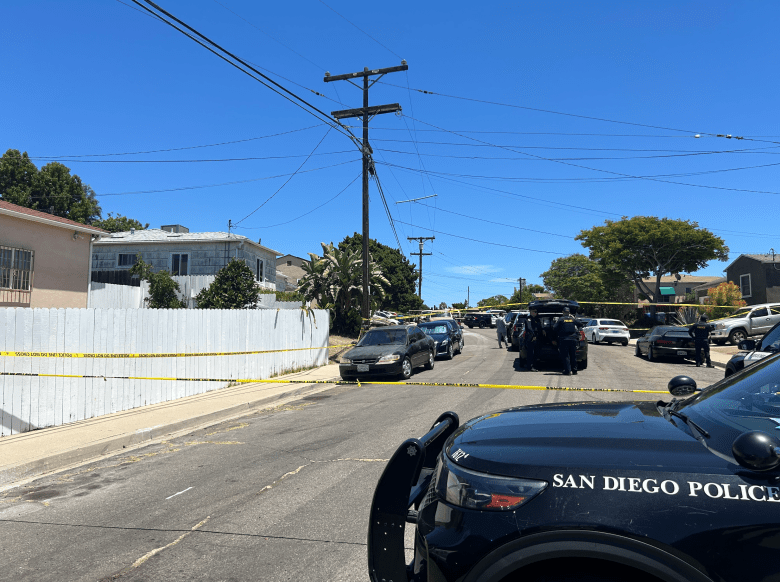It took some doing, but a bill that would increase penalties for people who buy sex from a minor has cleared its last hurdle in Sacramento and is now awaiting the signature of Gov. Gavin Newsom.
The new law would make it a felony for older adults to buy 16- and 17-year-olds for sex — and it would also make it a crime again to loiter with the intent to purchase anyone for sex.
Newsom supported the bill early as it began a long and torturous journey to Senate approval. The governor is joined by numerous advocacy groups who oppose selling humans for sex; they collectively pushed long and hard on
AB 379
through a field of political landmines.
Dr. Stephany Powell
, a retired LAPD sergeant who ran the vice unit for the department, shared a message with hundreds of activists who were part of the effort to support the bill.
“I have tears of joy as I write this, AB 379 just passed 33 to 2. Huge applause for the warriors who stayed in the fight,” Powell said.
One such warrior is
Marjorie Saylor
with the California Survivor Coalition. The San Diego resident is a survivor of trafficking and also a leader in the anti-trafficking movement locally and across the state, and is an advocate for survivors.
The passing of AB 379, she said, is a huge win for survivors. “We finally feel we are moving the needle toward addressing the demand side of trafficking,” she said. “Without demand, there is no need for a supply of victims.”
Saylor attended every committee hearing as the bill moved from the Assembly side to the Senate.
“It was an uphill battle, a roller coaster of emotions,” she said.
She recalled in committee hearings how sex workers “weaponized the political climate around the immigration crisis” by testifying that AB 379 would make it a deportable criminal offense “to smoke a cigarette outside of a strip club, to walk to work as a porn producer, or wave out the window at someone you thought looked cute.”
The video of this testimony is on the website of the
Sex Workers Outreach Project in Los Angeles
, which says the legislation was “built for abuse.”
“This law expresses unequivocally that children and adults are not for sale,” said San Diego County District Attorney Summer Stephan. “It provides law enforcement with the essential tools to protect victims from traffickers and criminal buyers, as well as expands resources to support victims in their recovery from trauma.
“I am proud to co-sponsor Assembly Bill 379 and thankful to Assemblywoman Krell for authoring this vital legislation to strengthen our human trafficking laws. By improving these laws, we can safeguard the most vulnerable and prevent irreparable harm to lives.”
As the bill moved through the two chambers, it encountered a number of stops and starts, a dramatic press conference by the governor calling for its passage on the California Assembly side, and Democrats taking opposing stances on the legislation — which was originally written by a fellow Democrat and a former prosecutor, Assemblymember Maggy Krell of Sacramento.
The bill would become stuck in the Assembly by legislators who feared the loitering element would lead to more arrests of minority men. It eventually survived and moved to the Senate side.
On the Senate side, lawmakers wanted to strip the portion of the bill that allowed prosecutors to levy felonies against those who paid 16- and 17-year-olds for sex.
Krell was asked to remove the element. She refused, and her name was stripped from the bill and replaced by the chair of the Assembly Public Safety Committee, Burbank Democrat Nick Schultz.
Saylor said she and other advocates thought the bill would soon be dead or likely get further watered down. But instead, Schultz pushed the bill through committee with key elements intact, and then some.
Krell’s name was later added back to the bill as a co-author.
The leader of the Democrats in the Senate side who opposed the original language of the bill was Democratic Sen. Scott Wiener. Wiener was the author of an earlier bill —
SB 357
— which became law.
Under SB 357, police could not question anyone loitering without probable cause.
The San Diego Police Department and other police agencies said they believe as a result of the Weiner bill, prostitution and pimping increased dramatically on California streets.
Wiener and supporters eventually folded on opposing the AB 37 element that would lower the age to 16- and 17-year-olds, but he continued up to the end to oppose the loitering element in the new bill.
Get neighborhood news in your inbox. It’s free and enlightening.
Join the 20,000+ people who get Times of San Diego in their inbox at 8 a.m. every day – plus breaking news alerts.
We’ve also added weekly updates from San Diego neighborhoods! By clicking sign up, you agree to the
terms
. Select below.
Other elements of the bill give more power to prosecutors in solicitation cases. Adults face a potential felony if they solicit a minor more than three years younger than they are.
In other words, if a 21-year-old solicits a 15-year-old, that is a potential felony charge. Loitering in a public place with the intent to buy sex is now a misdemeanor.
In addition, Schultz added more anti-trafficking elements to the new bill. It will increase the penalties for businesses in areas with a high level of prostitution for not posting signs to deter or warn the public.
For example, the signs might say, “Warning Prostitution and Drug Area” or “Area of High Prostitution activity.”
In San Diego, much activity is in and around hotels and motels.
The bill says the
state Attorney General
may prosecute those “knowingly turning a blind eye” to what is happening in their hotel.
A final element of the bill allows for continuity of legal representation. Normally, new attorneys for the district attorney work a case early in the process, starting at arraignment. Then as the case progresses, more experienced prosecutors step in.
The bill provides funding for 11 district attorneys in the state that would allow them to keep the same prosecution team on a case from arrest to sentencing.

 by
by 

